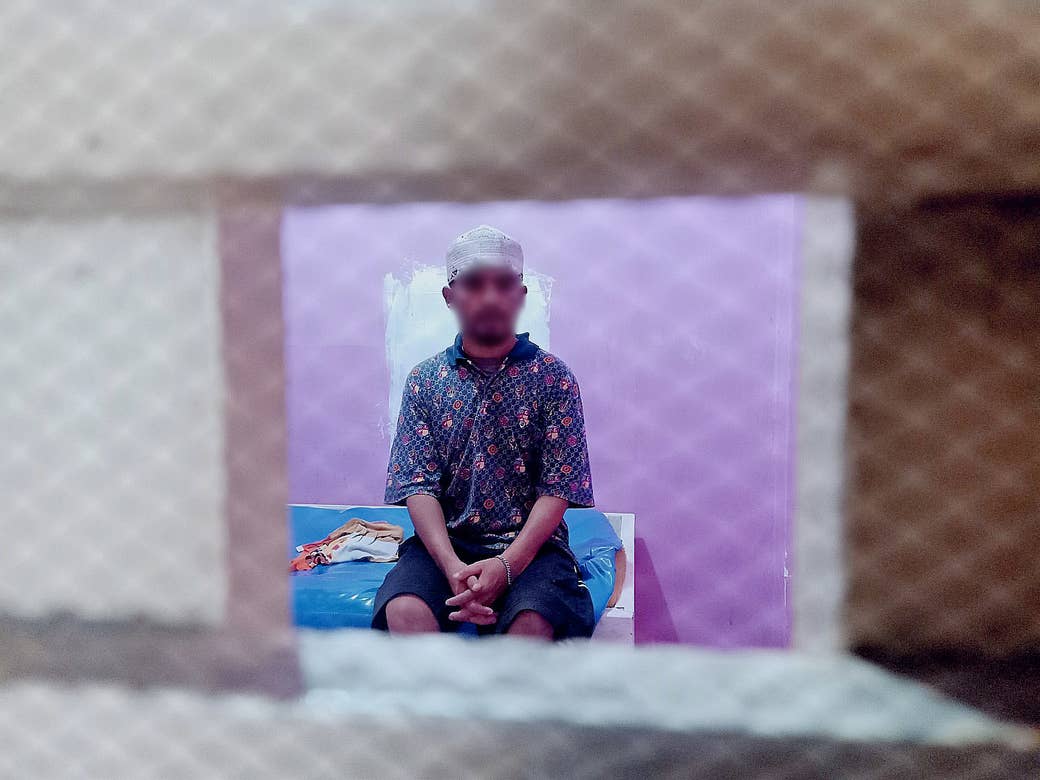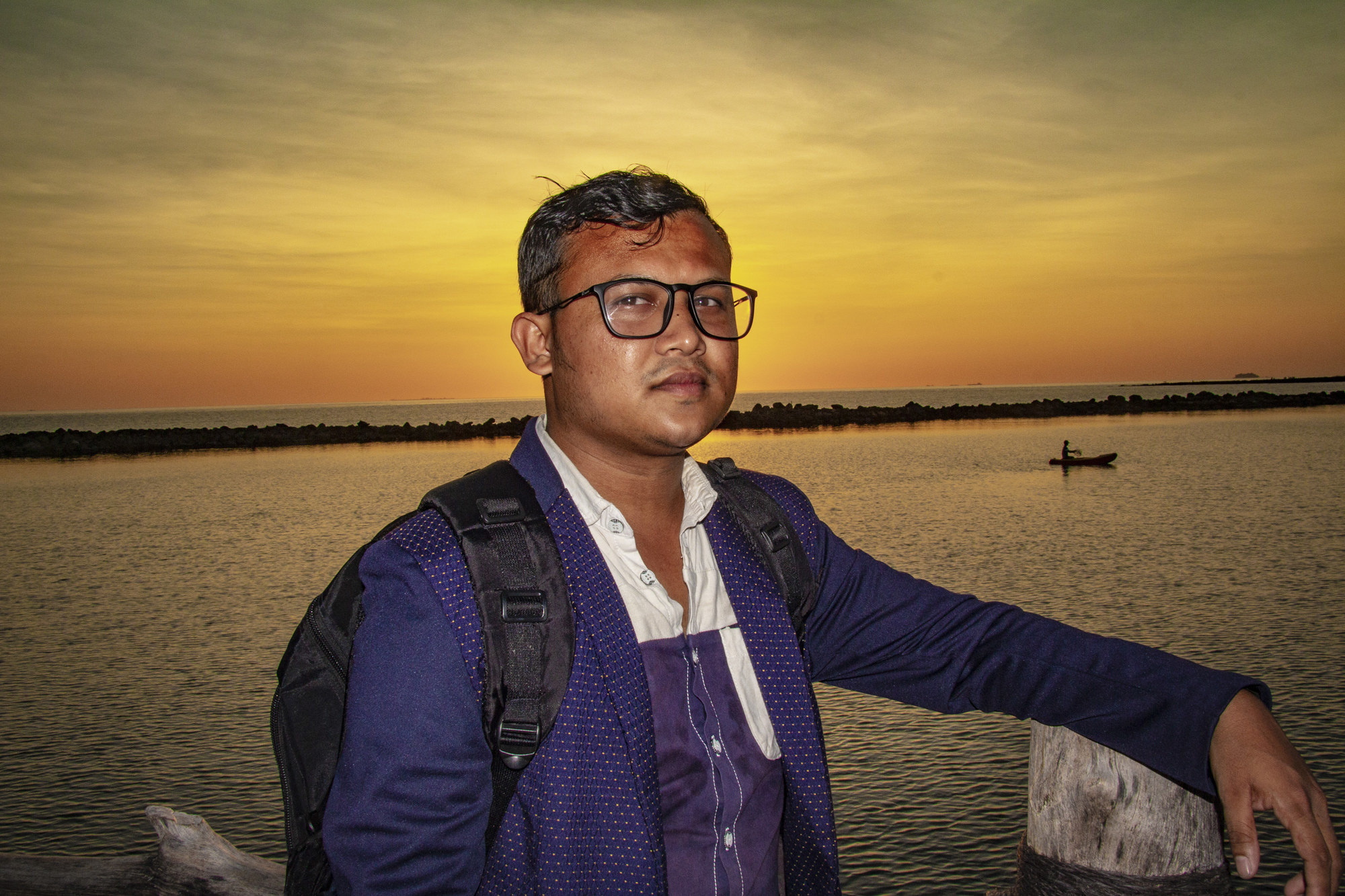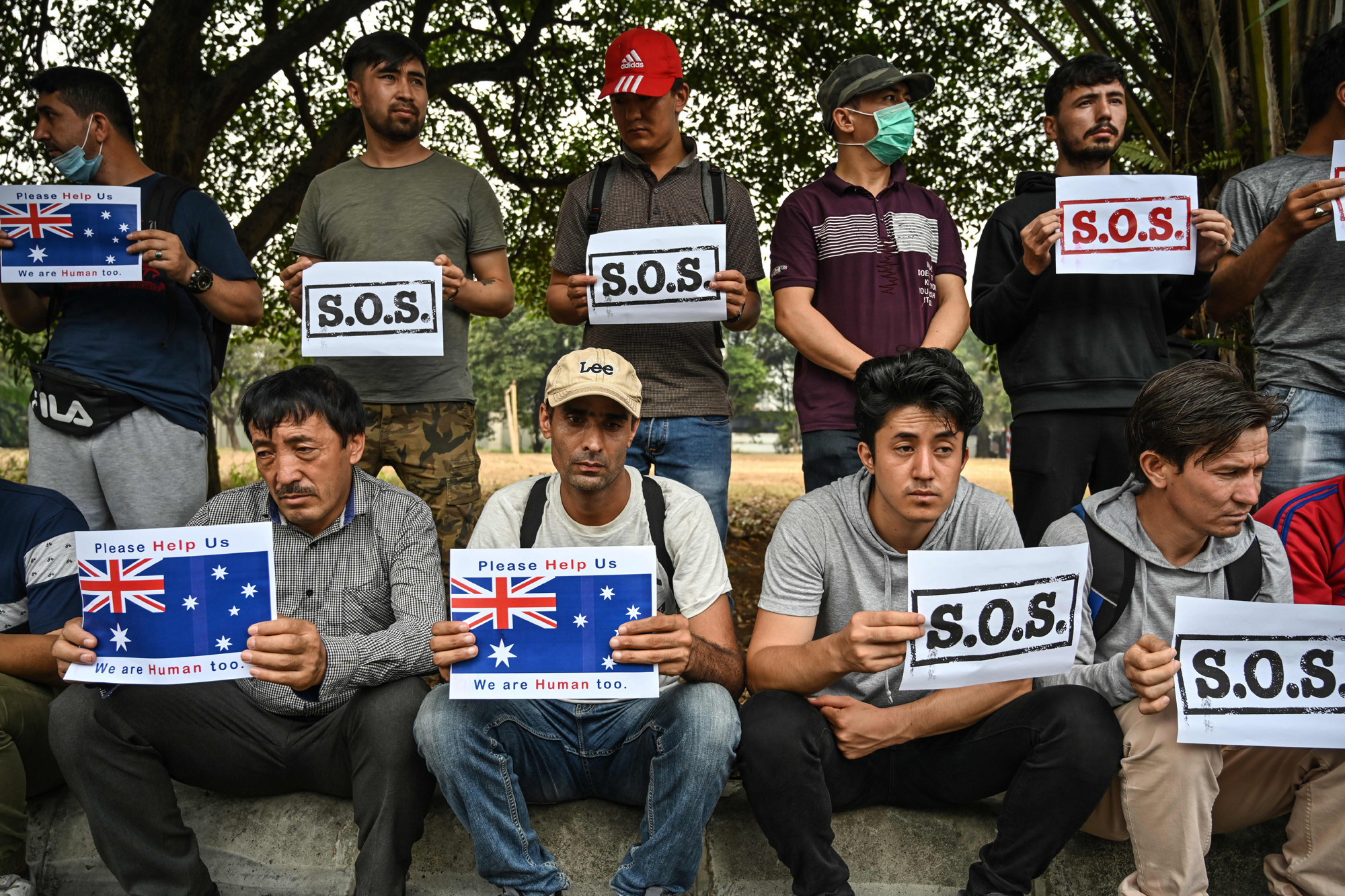In mid-January I visited M. Seras, a Rohingya refugee at a mental health clinic called Klinik Avicena in Makassar, Indonesia, for the second time. The first time I visited, I couldn’t find it, even though I was standing right in front of the building. It looked more like an abandoned drug store than a medical establishment.
A sign outside read: ONLY PERMISSION CARD HOLDERS ALLOWED ENTRY. When I asked a nearby shopkeeper about the clinic, she said, “There are a lot of complaints made against this clinic. The doctors rarely visit the patients. Most of the time, unprofessional nurses treat the patient. Two of my acquaintances were treated at this clinic for two years, but no changes in their health.” Twice I have visited there and I have never seen a doctor on the premises.
After convincing a security guard and nurse, I was allowed entry for only five minutes. I was there to see Seras who had been admitted to the clinic in early January. The interior of the clinic was prison-like and Seras was locked up in what could only be described as a cell. I asked the nurse to let Seras come out to talk to me, but the nurse refused, saying, “He is dangerous and it is not allowed”.
So we spoke through a small window in the door to his “room”. Seras said, “I have been suffering mentally without proper medical care for three years. This is my fourth time at this clinic and they keep me locked up all day.”

As we were talking, a Somali refugee passing by noticed me and called out “Please help me!”, but I was not allowed to talk to him. The nurses explained: “He is very depressed and stressed.”
Rohingya are part of the ethnic minority described by the United Nations as the most persecuted in the world. Rohingya have been subjected to discrimination and genocide by the Myanmar government for generations. In Myanmar (formerly Burma), Seras was denied his citizenship, basic rights to travel and government employment, and treated as an illegal immigrant in his own country.
In 2013, when the Myanmar government directed a massacre against the Rohingya in Rakhine state, Seras fled Myanmar by boat with around 100 people. After 10 days at sea, with hardly any food and water, he landed in Aceh, Indonesia. He was hospitalised for two weeks and then transferred to the detention centre in Kupang, where he remained for nearly a year. After being recognised as a refugee by the UNHCR, he was then released into IOM (International Organisation for Migration) community housing in Makassar in 2014, where he first experienced mental health problems. Seras later married a local woman and they had two children.
Now he is in Klinik Avicena, one of thousands of refugees stranded in Indonesia who are existing in indefinite limbo.
Indonesia is a non-signatory to the 1951 UN refugee convention, and refugees there are labelled as illegal immigrants. In some non-signatory countries, such as Malaysia, refugees are allowed to take up casual work and have access to a few basic rights such as education, freedom of movement and making a living. But in Indonesia, refugees do not have these rights. In December 2016, president Jokowi signed a new decree addressing refugee concerns. However this decree covered only general issues and offered neither legal certainty nor a durable solution for the refugees.
In Indonesia, refugees in IOM accommodation face restrictions. A curfew is imposed from 10pm to 6am. If they are delayed or fail to return to their designated accommodation, they are punished by being sent back to the detention centre for three months. They are also forbidden to drive any vehicle as they cannot apply for a licence.

Assodulah Amiri is a refugee who has been waiting for resettlement to a third country for eight years. “The situation here is worse than IDC (immigration detention centre). When I was there, I saw the door was locked for 24 hours and I admitted that I was in prison, and I had a hope that I would be released to freedom. But, when I was transferred to IOM accommodation, things became more complicated day by day as I realised that I had been sent to an infinite open prison with no certainty of my future. I am treated as an unwanted person, less than a human being. This system is designed for refugees to give up and go back to our countries or die slowly in stress and anxiety.”
Erfan Dana, a Hazara refugee and community leader, listed seven Hazara refugees who have died by suicide in different cities in Indonesia in recent years.
One of them was his friend Abbas Mohammedi, a 22-year-old Hazara refugee who wrote to Dana before killing himself in Batam on Sept. 30, 2018. The letter read, “No one is guilty of whatever has happened to me. I personally took the decision to commit suicide. I am tired of living in this world, I want to comfort myself.”
Australia, a signatory to the UN refugee convention, was the intended destination for many refugees who came to Indonesia. Refugees seeking safety planned to continue their journey by boat towards Australia as they knew that Indonesia would not accept them or offer any durable solution.
But in 2013 an announcement from prime minister Kevin Rudd changed that. He declared that any person arriving by boat, even if registered with the UNHCR, could no longer hope for resettlement in Australia. The goal of Australia’s policy was to stop people embarking on such a journey at all after many died at sea.
Erfan’s friend Abbas reached Indonesia after this critical deadline. He waited for five years, but could not evade the buffer zone created by Australia’s deterrence policy. Others who attempted the boat trip to Australia were intercepted by the navy and turned around, or sent to offshore detention on Nauru and Manus Island.
In 2014, then immigration minister Scott Morrison — now the prime minister — said any refugees who registered with the UNHCR in Indonesia after June 2014 would not be resettled in Australia, and reduced the number of refugees that would be resettled in Australia. In 2018, just 84 refugees from Indonesia were resettled in Australia, and in 2019 that number was 44, according to the UNHCR’s resettlement data tool.
Dana believes these developments in Australia’s refugee policy cost Abbas his life.

Psychologists agree that the ongoing uncertainty is contributing to a mental health crisis among refugees in Indonesia. “There is only one psychologist for all the refugees in Makassar. They are very anxious about their future,” said Sulasmi Sidiman, a psychologist at Bosowa University who used to teach refugees in Makassar.
Sidiman said refugees are stressed because they face cultural and language barriers, receive no local social support and are “mentally isolated”.
“This makes them depressed because they cannot adjust to the environment. They don’t have any daily activities to keep their brain function working. They don’t feel like they are at home here as they are not accepted by their neighbours; they are being called illegal immigrants. Under such circumstances, they can suffer from mental disorders. In worse case scenarios, this can lead to suicide and schizophrenia and affect their physical health as well.”
Istiana Tajuddin, a psychologist and a lecturer at Hasanuddin University, recalled treating a refugee patient who had schizophrenia: “Her issue was insecurity. She told me that she felt as if she had been cursed. In Afghanistan she felt insecurity from wars. Now, she is feeling another insecurity in Indonesia.”
Tajuddin’s patient would sometimes ask her: “Why me? Why not another person?”
Refugees say the Indonesian government needs to stop positioning itself as only a transit country.
“Medication cannot help when you are not happy inside,” said Reyas Alam, a 29-year-old Rohingya refugee who has been in Makassar waiting for resettlement for seven years. “To treat the refugee’s mental health problems, you need to provide them some hope of a future. We need a solution more powerful than medication.”
Dana said: “We humbly ask responsible organisations to help us and address the need for stable, long-term physical and mental health care for refugees suffering from depression and anxiety.”
When I asked Seras, in his room in Klinik Avicena, how he became depressed, he told me: “I fled Myanmar for safety, but in Indonesia, I am treated the same as in Myanmar and I have been trapped in limbo with no certainty of my future. I cannot work or pursue any formal education. If I want to go somewhere for some refreshments, I cannot afford the transport fees. I receive an allowance of [USD$70] per month, which is barely enough to provide me with food and buy daily necessities. I now worry that I cannot support my family. Sadly, one of my children is disabled and I cannot do anything to help him either.”
At the end of my visit, he paused for a moment and added, “I have seen other refugees die in these conditions. Please ask my people to give me a proper burial if I die.”
You can call Lifeline Australia on 13 11 14 or Beyond Blue Australia on 1300 22 4636. The National Suicide Prevention Lifeline in the United States is 1-800-273-8255. Other international suicide helplines can be found at befrienders.org.
